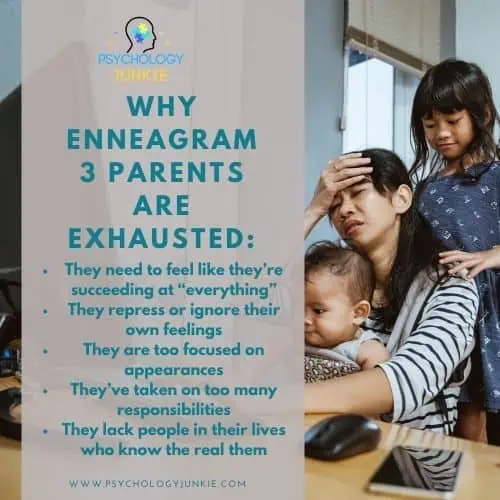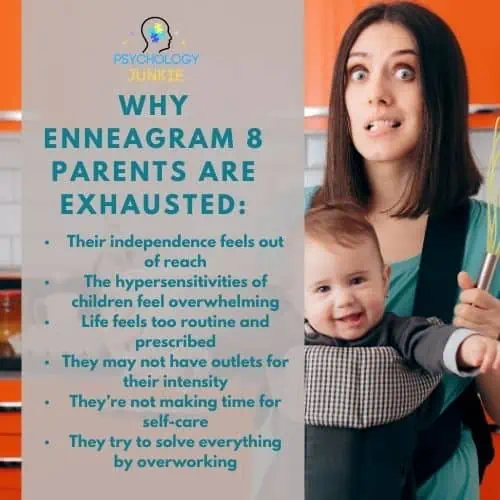Why Every Parent is Exhausted, Based On Their Enneagram Type
Parenting is exhausting. From the early days when you’re awake all hours of the night with a crying baby, to the teen years when rebellion rears it’s head. How do the different parents cope? Often we think our struggles are ours alone. As a society we’ve lost touch with our sense of community in many ways. But the truth is you’re not alone in your struggles. What you’re going through is something that many other parents will understand; especially if they share your Enneagram type. In today’s post we’re looking at the unique struggles of each Enneagram type and explaining why parents today are so exhausted based on their types. I hope this article provides solidarity and encouragement that you’re not alone in what you’re going through, and maybe a few tips to help you out in the rough moments.

Estimated reading time: 31 minutes

Why Every Parent is Exhausted, Based On Their Enneagram Type
The Enneagram One Parent

The average One parent is stuck on an endless quest for perfection, not just in their children but also in themselves. Self-discipline and order is the name of the game, and anything that falls short of these expectations can feel like a slap in the face.
For the One, their unique code of parenting is an extension of their childhood role. Early in childhood, Ones often felt that they had to “grow up” faster than their peers. The accelerated growth and responsibility they shouldered early on seems to have cast a long shadow over their parenting approach. In some ways, they’ve always felt like they had to carry this intense burden of responsibility. And at times they can resent it.
Now let’s look at failure. Failure is a tough pill for anyone to swallow; but especially Ones. Their core fear is that they’re bad or corrupt. Their core desire is to be righteous, or “good.”
But what does this look like when a One blows up in a moment of exhaustion?
How does this feel for a One who’s child makes dangerous choices as a teen?
For the Enneagram One parent, failure is not just a setback – it’s a devastating blow to their very identity. They perceive it as a catastrophic testament to their shortcomings, both as a parent and as an individual. In the face of failure, the One parent may self-flagellate with relentless criticism, internalizing the situation as a personal flaw rather than an isolated event. The need to “correct” mistakes becomes an all-consuming fixation, amplifying their stress levels to an unbearable degree. This self-imposed pursuit for perfection can create a sense of rigidity, leaving them feeling boxed in by their own impossibly high standards. In the most severe cases, this can lead to a frantic and exhausting cycle where the One parent is constantly on edge, fearful of any deviation from the ‘right’ path. This relentless self-scrutiny and self-criticism is not just debilitating for the One parent, but it also diminishes their ability to enjoy the precious moments of parenthood.
How Ones Can Step Off the Treadmill and Heal:
- Embrace Imperfections: Remind yourself that it’s okay for things to not be perfect. No parent, or human for that matter, is perfect. The beauty of life lies in its imperfections and your children will learn more from how you handle mistakes than from a perfect lifestyle.
- Avoid “Fixing” Your Children: Instead of trying to mold your child into a perfect version, accept them as they are. Each child is unique and they will encounter failures repeatedly in life. This is how they learn. This how they mature. And they’ll learn and mature in a much healthier way if they know they’ve got your unconditional support and love on the journey.
- Focus on the Big Picture: Don’t sweat the small stuff. Not everything will go as planned and that’s okay. Instead of getting upset over minor issues, look at the bigger picture and focus on what truly matters – your love for each other.
- Encourage Exploration and Failure: Encourage your child to explore new things and understand that failure is a part of the journey. Instead of seeing failure as a setback, see it as a learning opportunity. This will not only help your child grow but will also help you to be less critical.
- Have More Fun: Remember to have fun alone and with your child. Learn what “fills you up” emotionally and makes you feel good. Study your preferences and build up what fills your soul.
- Prioritize Leisure Time: Make sure to allocate some time for leisure activities. This will give you a break from your regular routine and help you to recharge and de-stress. DO NOT avoid this step – it’s extremely important.
- Don’t Repress Your Anger: If you’re feeling frustrated or angry, don’t bottle it up. It’s better to express your feelings in a healthy way rather than repressing them which could lead to a bigger and more damaging blow up further down the road.
- Don’t Take Responsibility for Every Mistake: Remember, it’s not your job to protect your child from every mistake. It’s through mistakes that they learn and grow. Instead of taking the blame for their mistakes, guide them on how to do better next time.
More like this: Escape the Trap of Resentment for Enneagram Ones
The Enneagram Two Parent

The Two parent, known for their caregiving and nurturing nature, can often find themselves losing themselves in the endless emotional landscape of parenting. These parents are the ones that struggle to say “No” when someone’s feelings are on the line. They volunteer for all the school events, help with their children’s homework, and take their kids out for ice cream when they encounter hurts or heartbreaks. It all sounds good, right?
But what happens when the Two is so other-focused that they lose themselves? What happens when the emotional needs never end? The demands Twos place on themselves to be perfectly loving and selfless can leave them feeling exhausted, scattered, and a little empty inside.
How does the Two parent navigate their own needs when they’re so concerned with everyone else’s?
What happens when a Two’s child asserts their independence and needs them less?
The Two parent, in their exhaustion, may feel unappreciated and unloved, leading to feelings of resentment. You see, Twos often take care of others in the ways they wish they had been taken care of as children. They try to give everyone else the love they so desperately desire. This can lead to a feeling of resentment or pain when others don’t realize this is what the Two really needs.
And as their child grows and asserts their independence, the Two may feel neglected, interpreting this natural progression as a direct rejection. This can create a sense of loss and emptiness, leading to stress and, in extreme cases, depression.
How Twos Can Re-Energize and Heal:
- Get to Know Yourself: It’s time to switch the focus from others to you. Understand your emotions, desires, and needs. You matter too.
- Become Aware of When You’re Giving to Get: Recognize your patterns of giving with expectations. It’s okay to give, but it’s equally important to ensure that giving doesn’t lead to depletion or resentment.
- Practice Asserting Your Needs and Wants: It’s not selfish to express your desires. You have every right to voice your needs and wants, and it’s essential to your wellbeing.
- Avoid Overpraising: Praise should be genuine and not excessive. Overpraising can lead to unrealistic expectations and a distorted self-image in children.
- Don’t Rescue Your Child from Everything: Allow your child to experience challenges and failures. It’s through these experiences that they learn resilience and problem-solving skills.
- Learn to Let Go: Understand that your child’s independence is a sign of them growing up, not a rejection of you. It’s important for children to develop independence and learn to navigate the world on their own.
- Let Your Children Fight Their Own Battles: It’s not your duty to solve every problem for your child. They need to learn to handle conflicts and resolve issues on their own.
- Develop Your Own Interests: Allocate time for activities that you love. Whether it’s a hobby, a course, or simply reading a book, indulge in what makes you happy.
- Journal: Journaling provides a safe space to express your feelings. It can be a therapeutic activity that helps you understand and manage your emotions better.
- Listen Rather Than Give Advice: Sometimes, your child might just need you to listen. Resist the urge to always provide advice and allow them to figure things out on their own.
You might also like: Escaping the Trap of Flattery for Enneagram Twos
The Enneagram Three Parent

The Three parent has a knack for juggling a multitude of tasks and responsibilities efficiently, all while seeming positive and energetic. Often they juggle work and home life with a restless drive to be “the best”. They’re the parents who make sure their children’s achievements are celebrated and recognized. If little Johnny tinkers on a piano at 2-years-old, chances are, he’ll be enrolled in piano lessons a week later. However, this constant focus on achievement can put undue pressure on both the parent and the child.
The Three parent can struggle with the concept of failure, both on a personal level and in regard to their children. They might unconsciously push their children towards success, and their love can sometimes feel conditional to their children’s achievements even when it’s not. The Three parent knows what it’s like to feel loved only when they get an “A” or a blue ribbon. They don’t want to impart this to their children, so the pain of realizing that perhaps they have can feel overwhelming.
While Threes may seem to be unstoppable on the outside, they often are filled with tremendous fatigue and overwhelm on the inside. They need to be the best parent, the best cheerleader, the best money-earner, the best on-demand therapist for their kids, the best looking parent. Whatever it is, there’s always another rung on the ladder they “need” to reach. It’s endless and it’s exhausting…and what they really want? Well, Threes often don’t know what they really want because they’re so busy trying to be the success they’ve always felt compelled to be.
So what happens when a Three “fails” at parenting, career, image, or any other way?
How do they cope when their child fails?
When Threes experience failure, their world can seem to crumble. In their pursuit of perfection and success, they have intertwined their self-worth with their achievements. Thus, failure can feel like a direct hit to their value as individuals, making them question their worthiness of love at all. The feeling of defeat can be so intense that it might lead them to consider giving up—not just on their goals, but on everything. This is because, for Threes, failure doesn’t just represent a single mishap or setback; it shakes the very foundation of their self-concept, a belief that they are successful and, therefore, worthy. When this belief is threatened, it can lead to deep emotional turmoil, feelings of despair, and a sense of meaninglessness.
How Threes Can Reach Authenticity and True Happiness:
- Practice Authenticity: Embrace your true self, accepting your struggles, weaknesses, and failures without judgment. It’s okay not to be perfect. Your authenticity can become one of the greatest catalysts for growth as a Three.
- Avoid the Temptation to ‘Market’ Yourself or Your Child: Your worth, and your child’s, is not defined by achievements or external validation. Strive for internal contentment rather than societal approval.
- Value the Inner World: Learn to give importance to inner feelings, emotions, and aspirations. They are as significant as external achievements.
- Seek Therapy: A professional can provide the tools and guidance to help you understand your true desires and aspirations. Therapy can be a valuable asset in your journey of self-discovery and personal development.
- Journal Regularly: Writing about your thoughts, feelings, and desires can be a cathartic experience. It helps you to understand yourself better and brings clarity to your emotions.
- Evaluate Your Expectations: Ask yourself whether you’re setting unrealistic goals for yourself or your child. Remember, it’s okay to aim high but not at the expense of mental peace and happiness.
- Practice Breathing Techniques: Simple breathing exercises can help reduce stress and anxiety. They bring a sense of calm and mindfulness, helping you to manage your emotions better.
- Welcome Failure as a Learning Opportunity: Don’t let the fear of failure hinder you or your child from exploring new opportunities. Failure is an essential part of growth and learning.
- Praise the Effort, Not the Result: Focus on the hard work and effort put into an activity instead of the end result. This approach promotes resilience and encourages children to persist in the face of challenges.
You might also enjoy: Escaping the Trap of Vanity for Enneagram 3s
The Enneagram Four Parent

The Four parent has a unique ability to foster creativity, emotional intelligence, and individuality within their children. Often seen as the ‘individualist’ of the Enneagram types, Fours have a deep understanding and appreciation for the emotional landscape, which they naturally impart upon their children. They encourage their children to explore their individual identity, to dig deep within themselves and to express their inner world through various forms of self-expression.
Despite these strengths, Fours often experience significant challenges when it comes to parenting. The external demands of parenting can sometimes feel overwhelming for Fours, who thrive in their internal world and require ample time alone to process, create, and explore. The fast-paced lifestyle of parenting can feel suffocating, inhibiting their ability to process a lot of emotion and thought.
Moreover, Fours can often feel ‘boxed in’ by the societal norms of parenting. The expectations and rules can feel limiting, stifling their individualistic nature and, in turn, their ability to foster individuality within their children. And Fours already struggle with feelings of shame, fears that they lack identity or don’t ‘belong’, and can easily feel out of place in parent groups or big social gatherings at school.
So what happens when a Four has no time to introspect and process?
What happens when a Four is surrounded by parents who seem more “normal” or who seem to have all their duck’s in a row?
When Fours feel overwhelmed by external demands and cannot find the time and space for introspection, they may retreat inwards, deep into their landscape of emotions. This self-imposed isolation often stems from their feelings of inadequacy, of being “less than” others. Fours might perceive other parents as more “normal,” more adept at navigating the complexities of parenthood, while they struggle to hold it all together. This comparison can exacerbate feelings of alienation, leading them into a spiral of melancholy and self-doubt.
Depression can be a frequent visitor in the world of a Four parent. The weight of their profound emotions, coupled with a constant sense of feeling misunderstood, can lead to bouts of intense sadness.
Moreover, the intensity of the Four’s emotions can feel overwhelmingly powerful, especially when they are trying to help their children emotionally regulate. Their emotional depth can sometimes feel like a double-edged sword, making them vulnerable to painful emotional extremes and creating challenges in their parenting journey. They must always appear calm and capable and grounded. But inside there’s a storm raging. The pressure to always appear “together” is especially hard on Fours. Their intense emotions can sometimes spill over, making it difficult for them to be the calming, regulating force they wish to be for their children. This perceived inability can further fuel their feelings of inadequacy, perpetuating a cycle of emotional overwhelm and self-doubt.
How Fours Can Nurture Their Individuality and Manage Parenting Challenges:
- Prioritize Alone Time: Recognize that introspection fuels your authenticity and creativity. Make time for solitude, allowing yourself the space to process your emotions and thoughts. If it feels impossible due to parenting responsibilities, don’t hesitate to seek help. Ask a friend, partner, or babysitter to step in so you can have some time to recharge.
- Journal Your Feelings: Use writing as a tool for emotional processing. Journaling can provide clarity and perspective, helping you navigate your emotional landscape effectively. It can act as a sounding board, enabling you to untangle complex thoughts and feelings.
- Support Your Child’s Individuality: Every child has their unique path. If your child’s path seems more “conventional,” that does not make it any less valuable or profound. Refrain from projecting your desire for originality on your child. Let them define their individuality in their unique way.
- Stay Active: When emotions threaten to overwhelm, engage in physical activity. Cleaning a desk, organizing a drawer, or taking a walk in nature can ground you, anchoring you back in reality. Physical action can help alleviate emotional intensity, providing a sense of balance and control.
- Recognize Feelings as Feelings: Understand that feelings are not always representative of reality. You might feel like an outsider, but that does not necessarily mean you are one. Many parents grapple with similar challenges as you. It’s essential not to let these feelings dictate your self-perception.
- Appreciate Your Strengths: Instead of focusing on your perceived shortcomings, remind yourself of your strengths. You bring a wealth of positive qualities to the table as a Four parent. Your emotional depth, creativity, and ability to understand and foster individuality in your child are your unique strengths. Cherish them and don’t let momentary feelings of inadequacy overshadow these positives.
Find out more about Fours: The Enneagram Four Child
The Enneagram Five Parent

The Five parent brings a unique perspective, encouraging their children to explore the world of knowledge, fostering curiosity and independent thought. Labelled as ‘investigators’ within the Enneagram types, Fives are introspective, observant, and innovative, often instilling these qualities in their children. They expose them to an array of interests, encouraging them to think independently and pursue their passions.
Despite these strengths, Fives also encounter unique challenges in parenting. The constant demand for interaction and emotional availability that comes with parenting can feel taxing for Fives, who value privacy and need personal space to replenish their energy. This constant tug of war between their need for solitude and their children’s needs can create stress.
Moreover, societal expectations around parenting can be tricky for Fives to navigate. The emotional expressiveness often expected from parents may not come naturally to them, making them feel out of place. They might also struggle to handle the emotional needs of their children, which requires a level of openness and vulnerability that can be uncomfortable for them.
So what happens when a Five feels drained and lacks personal space?
What happens when a Five feels misunderstood due to their quiet, introverted nature?
When a Five parent starts to feel drained and lacks the personal space they need to recharge, they may withdraw, creating a distance between them and their children. Such withdrawal is not due to a lack of care or love but stems from their need for privacy. However, this can lead to misunderstandings or feelings of rejection in their children.
Furthermore, the Five’s quiet, introverted nature can make them feel misunderstood or marginalized, intensifying their sense of being an outsider. They might appear aloof or detached to others, even when they are fully engaged in their unique way. This can lead to feelings of isolation and a deepening sense of being different or ‘wrong’.
How Fives Can Balance Their Need for Privacy and Manage Parenting Challenges:
- Prioritize Personal Space: Recognize that you need to recharge. Make time for solitude to engage in your interests and pursuits. Seek help from a partner, friend, or babysitter to manage your responsibilities and maintain your sanity.
- Communicate Your Needs: Your children may not understand your need for privacy. Be transparent with them, explaining that your need for solitude is not a rejection of them. Assure them of your love and care, even when you need to be alone. Writing notes of love, and offering specific compliments in these notes, can make a world of difference.
- Express Emotions in Your Way: You might not be expressive in a conventional sense, but that doesn’t mean you can’t convey your feelings. Use your preferred mediums, whether it’s through writing, drawing, or sharing interesting facts, to express your love and care.
- Engage in Shared Interests: Find common interests with your kids. This can be a way to connect without draining your energy. It will also provide an avenue for you to share your knowledge and fuel their curiosity.
- Appreciate Your Strengths: While you may have your unique challenges as a Five parent, you also have your unique strengths. Your insightful, curious, and independent nature can nurture a love of learning in your children and teach them valuable lessons in independent thinking.
- Set Reminders: To prevent getting lost in your world and missing important commitments, set reminders on your phone or devices. This can be especially useful for remembering appointments or picking your kids up from school.
- Make Time for Kid-Friendly Play: Dedicate time to engage in activities your kids enjoy. It doesn’t have to consume a large chunk of your day; even short, quality playtimes (15 minutes is great!) can make a big difference.
- Give Yourself a Break: After spending time with your kids, allow yourself a little break. Use this time to recharge your batteries, engage in your interests, or just enjoy a few quiet moments.
- Recognize Stress Signals: If you find yourself becoming stressed and leaning towards authoritarian behavior, take it as a sign that you need to de-stress. This could mean taking deep breaths, going for a solitary walk, or even screaming into a pillow. Choose what works best for you and allows you to return to a calm state.
Discover more about Fives: The Enneagram Five Child
The Enneagram Six Parent

Six parents bring stability, warmth, and guidance into their children’s lives. Known as the ‘loyalists’ of the Enneagram types, Sixes are dedicated, responsible, and protective, often creating a safe and secure environment for their children to grow. These are the parents who will arm their children with information about safety, precaution, and the value of commitment, fostering a sense of security and stability.
However, Sixes also face unique challenges in parenting. Their anxiety and tendency to anticipate problems can sometimes become overwhelming, leading them to become overly protective or controlling. This constant worry about their child’s welfare can create stress and may even lead to health complications if not managed properly.
Moreover, Sixes’ desire for certainty and predictability can be challenged by the unpredictable nature of parenting. The constant changes, especially during the early years of a child’s life, can be unsettling for a Six parent.
So what happens when a Six feels overwhelmed by their anxieties?
What happens when a Six feels out of control in the face of changes?
When a Six parent starts to feel overwhelmed by their anxieties, they may become excessively worried and protective, which could stifle their children’s independence and growth. Their need for control in an unpredictable situation may also lead to rigid rules and high expectations that can create tension in the family.
Furthermore, given their tendency to question themselves, Sixes might struggle with parental decision-making, second-guessing their choices, and worrying about their implications. This can contribute to feelings of insecurity and stress – a further drain on their resources.
How Sixes Can Manage Their Anxieties and Parenting Challenges:
- Practice Self-Care: Recognize the importance of taking care of your mental health. Regular exercise, a healthy diet, adequate sleep, and mindfulness practices like meditation can help manage your anxiety.
- Seek Support: Don’t hesitate to ask for help. Whether it’s from your partner, family, friends, or a professional counselor, having a support system is crucial for managing anxiety.
- Embrace Uncertainty: Understand that uncertainty is a part of life, and especially a part of parenting. You can’t control everything, and that’s okay. Visualize yourself gently letting loose the reigns of “certainty” and letting yourself glide with the waves and ups and downs with less tension.
- Encourage Independence: Even though it might be hard, resist the urge to overprotect your children. Let them make mistakes and learn from them. This will foster their independence and resilience, and ease your anxieties over time.
- Find Healthy Coping Strategies: Whether it’s through deep breathing exercises, yoga, journaling, or any other method, find a coping strategy that works best for you to help manage your reactions to stress and anxiety.
- Celebrate Small Wins: Celebrate your achievements as a parent, no matter how small. This can boost your confidence and help mitigate self-doubt.
- Balance Fear with Faith: It’s natural for you, as a Six, to imagine worst-case scenarios. However, it’s important to balance this fear-based mindset with faith and optimism. Remember that the future is not solely comprised of potential dangers and pitfalls, but equally filled with opportunities and happiness. Begin to trust that good things can, and will, happen just as frequently as bad.
- Trust Your Inner Voice: Sixes often struggle with self-doubt, but it’s crucial for you to trust your instincts and inner voice. This doesn’t mean believing every worst-case scenario that plays before your mind’s eye. This does mean trusting the inner voice that tells you to relax, delegate responsibility, and trust yourself in the parenting process.
- Learn from Your Children: Let your children teach you important lessons about living in the moment, finding joy in simple things and embracing spontaneity. This will help you let go of control and enjoy the unexpected moments of parenthood.
- Conscious Catastrophizing: Be aware of your tendency to catastrophize. When you notice yourself spiraling into anxiety over what could go wrong, gently remind yourself that these are merely projections, not reality. Practice grounding exercises or engage in activities that help you stay present and focused on the now. This awareness and management of your thought patterns will allow you to replace fear with a more balanced, optimistic perspective.
Discover more about Sixes: 7 Struggles of the Enneagram Six Personality Type
The Enneagram Seven Parent

Sevens aim to bring joy, enthusiasm, and adventure into their children’s lives. Known as the ‘enthusiasts’ of the Enneagram types, Sevens are energetic, optimistic, and always on the lookout for new experiences. They teach their children about the joy of exploration and the importance of positivity, creating a fun and stimulating environment for them to grow.
However, Sevens also face unique challenges in parenting. Their fear of being trapped in emotional pain or boredom can sometimes lead to avoidance of difficult situations or responsibilities. Sevens might struggle with setting boundaries or maintaining routine, which can create inconsistency for their children. In their quest for excitement, adventure, and distraction, they may over-commit to activities or jump from one experience to the next, wearing themselves out in the process.
What happens when a Seven feels constrained by the responsibilities of parenting?
What happens when a Seven fears dealing with negative emotions?
When a Seven parent starts to feel trapped by the responsibilities and routine of parenting, they may become restless and start to seek out new experiences to escape. This could lead to inconsistent parenting and a lack of routine for their children. Their fear of negative emotions might also lead them to avoid difficult conversations, which could undermine their children’s ability to deal with negative emotions and challenges.
Sevens need variety and freedom; but they also need to face their inner emotions and the pain they’d rather repress. Having children can bring all that emotion and pain to the surface, making it harder for them to avoid. They might struggle with feelings of guilt and inadequacy when they can’t protect their children from negative experiences or emotions. They might feel completely drained when they can’t “escape” from their negative feelings, or the negative feelings of their children.
How Sevens Can Manage Their Need for Freedom and the Stress of Having Children:
- Be Present: Accept the gift of each moment and find the spark of joy in it. Don’t get stuck in a constant fantasy of “later”, when your children are older or life is different. Make a game out of finding the fun in the now.
- Energy Awareness: Understand that some children may feel overwhelmed by your restless energy. Learn when to provide downtime for those specific kids who need more quiet and stability.
- Make Everyday Tasks Fun: Infuse ordinary tasks with fun. Blast music and dance while cleaning the house, play an audiobook while running errands, or dream up 10 things you’re grateful for while waiting to pick up your children from school.
- Process Emotions: Learn the importance of processing emotions, even when they’re negative. Journal your thoughts, engage in deep breathing exercises, meditate, or confide in someone you trust. Take the leap and be vulnerable, it is a part of growth and will help you better connect with your children’s emotions as well.
- Create Boundaries: Sevens can feel overwhelmed by their desire for new experiences and the demands of parenting. It’s essential to set boundaries and create a routine that provides stability for your children and allows you time for your adventures.
- Seek Balance: While it’s natural for you as a Seven to seek adventure and new experiences, remember to balance this with periods of rest and relaxation. Engage in activities that rejuvenate you, whether it’s reading a good book, taking a long walk, or simply enjoying a quiet cup of coffee.
- Embrace Healthy Escapism: Find healthy ways to satisfy your need for escapism. This could be through engaging in a hobby, reading a book, or taking part in regular physical activity. These outlets can serve as positive distractions and help manage feelings of restlessness.
- Acknowledge and Accept Negative Emotions: Remember that it’s okay to feel negative emotions and it’s an important part of the parenting journey. By acknowledging and accepting these feelings, rather than avoiding them, you can foster a more open and honest relationship with your children.
Find out more about Sevens: 7 Struggles of the Enneagram 7 Type
The Enneagram Eight Parent

Eights bring a strong sense of protection, justice, and empowerment into their children’s lives. Known as the ‘challengers’ of the Enneagram types, Eights are assertive, direct, and often have a natural ability to lead. They teach their children about the importance of resilience, fairness, and self-reliance, creating a powerful and dynamic environment for them to grow.
However, Eights also face unique challenges in parenting. They struggle with the fear of being controlled or hurt, which can often lead to an overemphasis on strength and independence. They may feel trapped in the confines of parenting; the errands, the “rules”, and the sensitivities that can seem silly (“who cares if your toast is in triangles instead of rectangles?”) This could sometimes result in a feeling of being suffocated or with outbursts of anger and restlessness. Eights may also have difficulty showing vulnerability and expressing softer emotions.
What happens when an Eight feels trapped in the mundane cycle of parenting?
What happens when an Eight struggles to show vulnerability or foster that in their children?
When an Eight parent feels trapped in the mundane cycle of parenting, they might react with impatience or frustration, seeking avenues of control and resistance to the routine. Their inherent need for independence and control could lead to conflicts and power struggles within the family setting. Eights may also struggle to show vulnerability, which can inadvertently create an environment where their children also struggle to express their softer emotions or display their vulnerabilities. This can foster a sense of emotional disconnect, and potentially inhibit the development of emotional resilience and empathy in their children.
How Eights Can Manage Their Need for Control and the Stress of Parenting:
- Embrace Vulnerability: Remember, it’s okay to show softer emotions and to let your guard down. By doing so, you not only model emotional authenticity to your children, but you also create a safe space for them to express their feelings. It can also help you to feel more balanced in the long run, even though the beginning can be challenging.
- Foster Healthy Competition: Encourage activities that involve healthy competition, as it aligns with your natural instinct as an Eight. Whether it’s a family game night or sports activities, these settings not only allow you to thrive but also teach your children about perseverance, teamwork, and the spirit of fair play. Remember to emphasize the importance of enjoyment and effort over winning.
- Make Time for Personal Pursuits: It’s crucial to carve out time for your personal interests and pursuits. This is where you can express yourself freely, without restraint or judgment. It might be engaging in a physical activity, reading a challenging book, or even pursuing a hobby. This time to explore your own interests will not only provide an outlet for your strong energy and desire for control but also model to your children the importance of personal growth and self-care.
- Let Go of Control: Life is unpredictable, and parenting is no exception. While it might feel uncomfortable, it’s important to let go of control and embrace the spontaneity and unpredictability of raising children.
- Nurture Patience: Parenting involves many routine activities and responsibilities. Instead of viewing these as constraints, try to see them as necessary aspects of providing a stable and secure environment for your children. This shift in perspective might make the mundane seem more bearable.
- Foster Open Communication: Encourage your children to express their thoughts and emotions freely. While it might be challenging, try to refrain from dominating the conversation or making hasty judgments. Listen to understand, not just to respond.
- Practice Empathy: Understand that not everyone sees the world as you do. Encourage your children to be independent, but also remember to support them and acknowledge their feelings, even when they differ from your own.
- Seek Support: It’s not a sign of weakness to ask for help. Whether it’s seeking advice from a friend, a family member, or a professional, external perspectives can offer valuable insights
- Provide Love and Reassurance: As a parent, remember to regularly express your love for your children and reassure them of their worth, independent of their achievements. This helps create a nurturing and supportive environment where they feel valued and secure.
You Might Also Enjoy: How Each Enneagram Type Would Survive on a Deserted Island
The Enneagram Nine Parent

Nines aim to bring a sense of peace, acceptance, and serenity into their children’s lives. Known as ‘the peacemakers’ of the Enneagram types, Nines are accepting, open-minded, and imaginative. They strive to cultivate a harmonious environment and teach their children about the importance of understanding, patience, and acceptance.
However, Nines also face unique challenges in parenting. They carry a deep fear and discomfort of conflict, disharmony, and tension. They may avoid confrontations or difficult conversations, tending to prioritize peace and stability over addressing issues. In their efforts to “not rock the boat” they may deny the very things that bring them joy. They may also find the emotional meltdowns and inherent drama of parenting completely exhausting. Setting boundaries requires speaking up, and some Nines struggle to do that. Making peace between warring siblings is good, but sometimes Nines exhaust themselves in the process. Some Nines are so focused on maintaining a peaceful environment that they sacrifice their own needs for the sake of everyone else, or they ignore important issues that need addressing.
What happens when a Nine avoids confrontations or difficult conversations?
What happens when a Nine struggles to assert their needs or desires?
When a Nine parent avoids confrontations or difficult conversations, they might inadvertently create an environment where issues are left unaddressed, leading to potential resentment or misunderstanding in the long run. Their struggle to assert their own needs or desires can result in feelings of neglect or dissatisfaction. It might also set an example for their children that it’s okay to suppress their needs or desires in favor of maintaining peace.
How Nines Can Manage Their Fear of Conflict and the Stress of Parenting:
- Embrace Conflict: This is, of course, easier said than done. This is a huge step for a Nine and one that should be pursued with patience and gentleness. Remember, conflict is a part of life and can often lead to growth and deeper understanding. Encourage open discussions and convey to your children that it’s okay to voice differing opinions.
- Prioritize Self-Love and Assertiveness: As a Nine, it’s crucial to understand the significance of loving yourself enough to give yourself a voice. Remember, your thoughts and feelings are just as important as anyone else’s and deserve to be heard. When you assert yourself and express your needs, you not only make space for personal growth and self-validation but also model a significant life skill for your children.
- Practice Mindfulness: Mindfulness can help Nines to stay focused and engaged in the present. Whether it’s through yoga, meditation, or simply taking a moment to breathe, practicing mindfulness can help you to overcome feelings of exhaustion, inertia, or distraction
- Acknowledge Your Desires: It’s important to recognize and express your own needs and desires. By doing so, you model to your children the importance of self-awareness and self-advocacy.
- Encourage Activity: Nines can sometimes struggle with inertia. Encourage activities that engage both you and your children in new experiences and challenges. This not only helps to break the cycle of complacency but also teaches your children about adaptability and resilience.
- Establish Clear Boundaries: Create clear boundaries and expectations. This provides a sense of security for your children and helps foster respect and understanding within the family. This can be something simple like establishing designated quiet times or specific household chores. In the end, your life will be much easier as a result.
- Seek Support: It’s not a sign of weakness to ask for help. Whether it’s seeking advice from a friend, a family member, or a professional, external perspectives can offer new insights and strategies.
You Might Also Enjoy: The Lie That Each Enneagram Type Believes, and How to Avoid It
What Are Your Thoughts?
We’d love to hear your thoughts and experiences! Do you have insights or tips that have helped you navigate parenting and manage stress? Any advice for other parents who might be facing the same challenges? Please share in the comments below.
References:
Better Parenting with the Enneagram by Ann Gad (Findhorn Press, 2021)
Personality Types: Using the Enneagram for Self-Discovery by Don Richard Riso with Russ Hudson (Houghton Mifflin Company, 1996)
Subscribe to Our Newsletter

Want to discover more about personality type? Get the inside scoop with Susan Storm on all things typological, along with special subscriber freebies, and discounts on new eBooks and courses! Join our newsletter today!












This 100% resonated with me! Thank you for an insightful post that made me feel less like a terrible mom 🤭 I am a five and have always felt like there was something wrong with me because I do tend to isolate myself wayyyy more often than I should. The advice you provided will really help me to communicate my love for my kids a little better. Love your blog, thanks Susan!